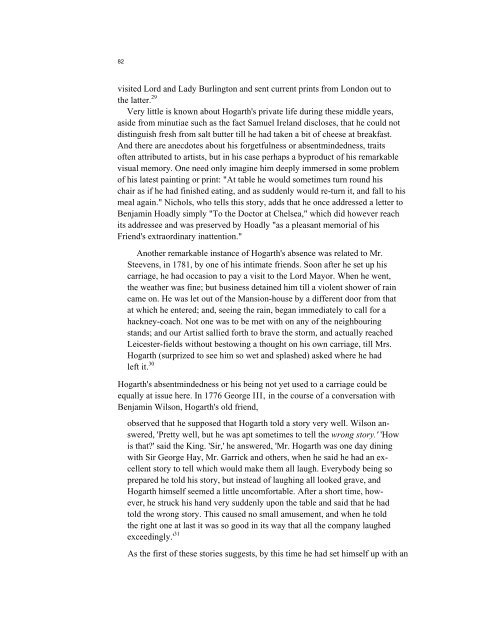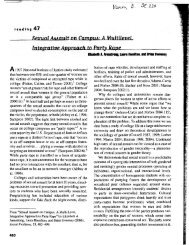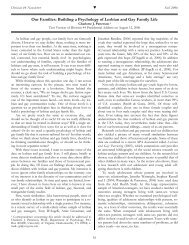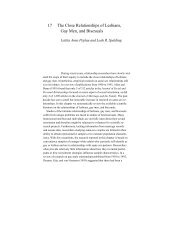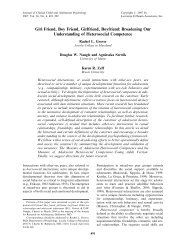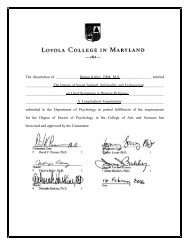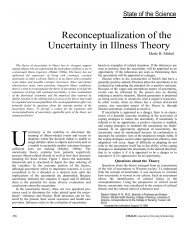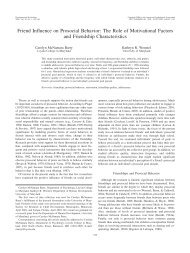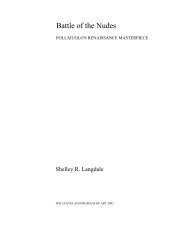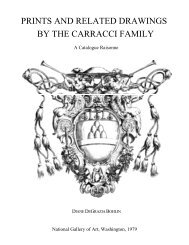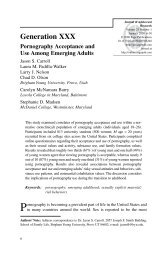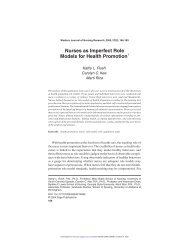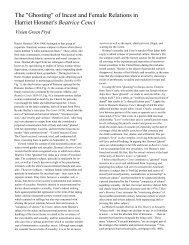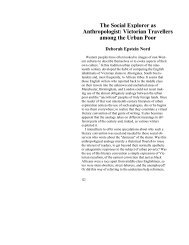Create successful ePaper yourself
Turn your PDF publications into a flip-book with our unique Google optimized e-Paper software.
82<br />
visited Lord <strong>and</strong> Lady Burlington <strong>and</strong> sent current prints from London out to<br />
the latter. 29<br />
Very little is known about <strong>Hogarth</strong>'s private life during these middle years,<br />
aside from minutiae such as the fact Samuel Irel<strong>and</strong> discloses, that he could not<br />
distinguish fresh from salt butter till he had taken a bit of cheese at breakfast.<br />
And there are anecdotes about his forgetfulness or absentmindedness, traits<br />
often attributed to artists, but in his case perhaps a byproduct of his remarkable<br />
visual memory. One need only imagine him deeply immersed in some problem<br />
of his latest painting or print: "At table he would sometimes turn round his<br />
chair as if he had finished eating, <strong>and</strong> as suddenly would re-turn it, <strong>and</strong> fall to his<br />
meal again." Nichols, who tells this story, adds that he once addressed a letter to<br />
Benjamin Hoadly simply "To the Doctor at Chelsea," which did however reach<br />
its addressee <strong>and</strong> was preserved by Hoadly "as a pleasant memorial of his<br />
Friend's extraordinary inattention."<br />
Another remarkable instance of <strong>Hogarth</strong>'s absence was related to Mr.<br />
Steevens, in 1781, by one of his intimate friends. Soon after he set up his<br />
carriage, he had occasion to pay a visit to the Lord Mayor. When he went,<br />
the weather was fine; but business detained him till a violent shower of rain<br />
came on. He was let out of the Mansion-house by a different door from that<br />
at which he entered; <strong>and</strong>, seeing the rain, began immediately to call for a<br />
hackney-coach. Not one was to be met with on any of the neighbouring<br />
st<strong>and</strong>s; <strong>and</strong> our <strong>Art</strong>ist sallied forth to brave the storm, <strong>and</strong> actually reached<br />
Leicester-fields without bestowing a thought on his own carriage, till Mrs.<br />
<strong>Hogarth</strong> (surprized to see him so wet <strong>and</strong> splashed) asked where he had<br />
left it. 30<br />
<strong>Hogarth</strong>'s absentmindedness or his being not yet used to a carriage could be<br />
equally at issue here. In 1776 George III, in the course of a conversation with<br />
Benjamin Wilson, <strong>Hogarth</strong>'s old friend,<br />
observed that he supposed that <strong>Hogarth</strong> told a story very well. Wilson an-<br />
swered, 'Pretty well, but he was apt sometimes to tell the wrong story.' 'How<br />
is that?' said the King. 'Sir,' he answered, 'Mr. <strong>Hogarth</strong> was one day dining<br />
with Sir George Hay, Mr. Garrick <strong>and</strong> others, when he said he had an ex-<br />
cellent story to tell which would make them all laugh. Everybody being so<br />
prepared he told his story, but instead of laughing all looked grave, <strong>and</strong><br />
<strong>Hogarth</strong> himself seemed a little uncomfortable. After a short time, how-<br />
ever, he struck his h<strong>and</strong> very suddenly upon the table <strong>and</strong> said that he had<br />
told the wrong story. This caused no small amusement, <strong>and</strong> when he told<br />
the right one at last it was so good in its way that all the company laughed<br />
exceedingly.' 31<br />
As the first of these stories suggests, by this time he had set himself up with an


